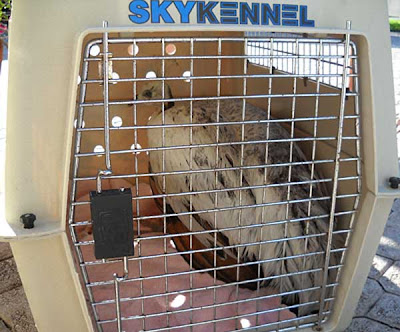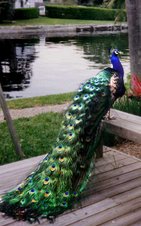
We were awakened at 7:30 a.m. today when our neighbor called to report Ms. Bird's disturbing behavior. Not roosting in a tree as is her normal practice, she stood all night on her covered patio, hunched over, with her head down – a portrait of patheticness – or perhaps depression.
She ignored food, water and people, allowing neighbor Sophia to pet her. (She would be way too wary for this normally.) Her eyes were closed, and seemed to have fluid around them.
By her appearance, it was clear she was in bad shape.
Now, keep in mind, this is one day after we removed her eggs from her nest, which clearly upset her.
Neighbors Lee and Sophia wanted to call the wild-bird doctor or the wildlife care center.
After seeing her condition, I agreed we needed professional help. I called Dr. Renata Schneider, the vet who cared for Mr. Bird, but got a phone message saying she was on maternity leave.
Next, I called the Wildlife Care Center, which agreed to come out first thing and take her into their care.
The sad bird put up little struggle when the wildlife worker went to grab her and put her in an animal crate. In a moment, she was off to the hospital.
(Just an aside: How is it possible that a sick peahen gets better, quicker medical care than a sick child?)
 Later, we visited the Wildlife Care Center and were happy Dr. Schneider, Mr. Bird's doc, had come in and was examining her.
Later, we visited the Wildlife Care Center and were happy Dr. Schneider, Mr. Bird's doc, had come in and was examining her.We don't have a diagnosis yet, but we know she's getting the best care possible.
We wonder, though: Is it really possible for a peahen to be so sad that she makes herself sick?
I was surprised when the fellow with whom I spoke at the Wildlife Care Center considered that a viable option – that she was suffering from depression. He suggested that when we get her back, we get another peafowl for company.
First, though, let's get Ms. Bird well.





